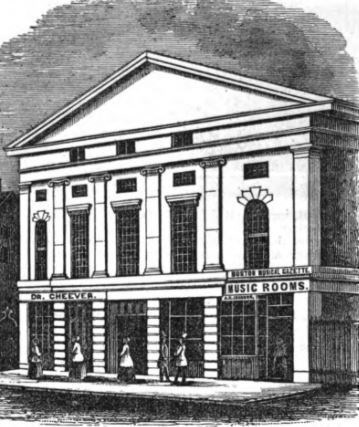Last updated: May 20, 2025
Article
Emancipation: A Boston Celebration

The Boston Directory, 1851
On January 1, 1863, thousands of people gathered to await word of President Lincoln's Emancipation Proclamation at Tremont Temple in Boston, Massachusetts. Messengers stationed through the city from the telegraph office stood ready to bring word of Lincoln's decision as soon as it came over the wire.
In his third autobiography, Frederick Douglass described that historic day at Tremont Temple:
The occasion, wherefore, was one of both hope and fear…Whether we should survive or perish depended in large measure upon the coming of this proclamation… We were waiting and listening as for a bolt from the sky, which should rend the fetters of four millions of slaves; we were watching, as it were, by the dim lights of the stars, for the dawn of a new day; we were longing for the answer to the agonizing prayers of centuries...1
When word reached Tremont Temple, the crowd exploded into jubilation as Douglass led the singing of the spiritual, "Blow Ye the Trumpet, Blow."2 Lincoln had finally made emancipation a tactic and a goal of the war, and with it, opened the doors of the military to Black soldiers.
The Tremont Temple gathering ended around midnight, but Douglass and others continued the celebration up on Beacon Hill, in the Black community, at the Twelfth Baptist Church. Douglass later recalled:
and soon that church was packed from doors to pulpit, and this meeting did not break up till near the dawn of day. It was one of the most thrilling occasions I ever witnessed, and a worthy celebration of the first step on the part of the nation in its departure from the thraldom of ages.3
Soon after the Emancipation Proclamation, Massachusetts began recruitment of the 54th Regiment, one of the first Black regiments to serve in the United States Civil War. Douglass threw himself full force into this endeavor and became a leading recruiter for this ground-breaking regiment.
To learn more about the 54th Massachusetts Regiment, please visit A Brave Black Regiment.
Footnotes
- Frederick Douglass, My Life and Times (Boston, DeWolfe and Fisk, 1892), 426. https://docsouth.unc.edu/neh/dougl92/dougl92.html.
- David Blight, Frederick Douglass: Prophet of Freedom, (New York: Simon and Schuster, 2018), 483.
- Douglass, My Life and Times, 429-430.
